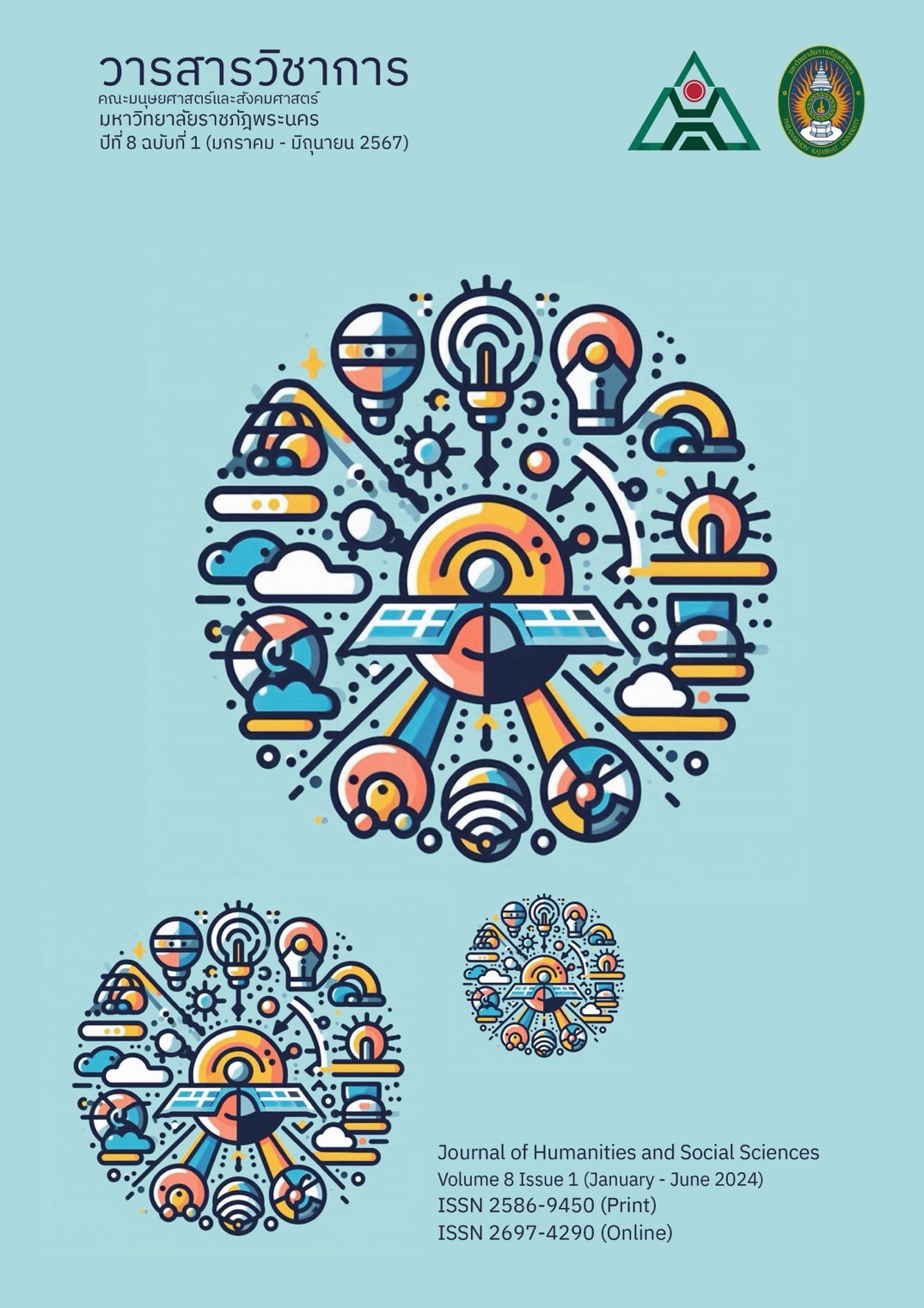RHETORICAL MOVES OF AI-GENERATED RESEARCH ARTICLE ABSTRACTS AND PUBLISHED RESEARCH ARTICLE ABSTRACTS IN APPLIED LINGUISTICS
Main Article Content
บทคัดย่อ
บทคัดย่อเป็นส่วนสำคัญในการตีพิมพ์บทความวิจัยในวารสารวิชาการโดยมีเนื้อหาสรุปบทความเพื่อช่วยให้ผู้อ่านประเมินความสำคัญของงานได้ โดยยุคปัจจุบันผู้เขียนอาจใช้เทคโนโลยีช่วย เช่น ChatGPT จาก บริษัท OpenAI เพื่อช่วยในการสร้างส่วนบทคัดย่อของบทความวิจัย โดยงานวิจัยนี้มีวัตถุประสงค์เพื่อระบุรูปแบบอัตถภาคในบทคัดย่อของบทความวิจัยที่สร้างโดย ChatGPT โดยเปรียบเทียบกับผลงานที่เขียนโดยมนุษย์จากวารสารที่มีชื่อเสียงในด้านภาษาศาสตร์ประยุกต์ ข้อมูลประกอบด้วยบทคัดย่อของบทความวิจัย 60 บทคัดย่อที่มาจากสองแหล่งข้อมูล โดยใช้รูปแบบการวิเคราะห์อัตถภาคของ Hyland (2000) เพื่อวิเคราะห์ความถี่และค่าร้อยละ ผลการวิจัยพบว่า บทคัดย่อที่สร้างโดย AI มักใช้รูปแบบ P-M-Pr-C ในขณะที่บทคัดย่อที่เขียนโดยมนุษย์มักยึดถือรูปแบบ I-P-M-Pr-C ส่วนความแตกต่างในรูปแบบการเขียนนี้เสนอให้เห็นว่าอาจมีความแตกต่างในเลือกใช้รูปแบบของภาษาระหว่างข้อความที่สร้างขึ้นโดยปัญญาประดิษฐ์และผู้เขียนมนุษย์ในบริบทของการเขียนบทคัดย่อ
Article Details
เอกสารอ้างอิง
Amnuai, W. (2019). Analyses of rhetorical moves and linguistic realizations in accounting.
research article abstracts published in international and Thai-based journals, SAGE Open, 1-9.
Anderson , N., Belavy , D., Perle , S., Hendricks , S., Hespanhol , L.,Verhagen, E. & Memon, A. (2023). AI did not write this manuscript, or did it? Can we trick the AI text detector into generated texts? The potential future of ChatGPT and AI in Sports & Exercise Medicine manuscript generation. BMJ Open Sport & Exercise Medicine, 9,e001568.
Biber, D. (2006). University language: A corpus-based study of spoken and written registers. John Benjamins.
Biber, D., Connor, U. & Upton, T. (2007). Discourse on the Move: using corpus analysis to describe discourse structure. John Benjamins Publishing Company.
Dergaa, I., Chamari, K., Zmijewski, P., Ben Saad, H. (2023). From human writing to artificial intelligence generated text: examining the prospects and potential threats of ChatGPT in academic writing. Biol Sport, 40(2), 615–622.
El-Dakhs, D. A.S. (2018). Comparative genre analysis of research article abstracts in more
and less prestigious journals: Linguistics journals in focus. Research in Language, 16(1),
-63.
Elali, F. & Rachid, L. (2023). AI-generated research paper fabrication and plagiarism in the scientific community. Patterns, 4, 1-4.
Flowerdew, J. (2004). The discursive construction of a world-class city. Discourse & Society, 15(5), 579-605.
Gao, C. A., Howard, F.M., Markov, N.S., Dyer, E.C., Ramesh, S., Luo, Y., & Pearson, A.T. (2023).
Comparing scientific abstracts generated by ChatGPT to real abstracts with detectors and blinded human reviewers. NPJ Digital Medicine, 6 (75), 1-5.
Hyland, K. (2000). Disciplinary discourses: Social interactions in academic writing. The University of Michigan Press.
Herbold, S., Hautli-Janisz, A., Heuer, U., Kikteva, Z., & Trautsch, A. (2023). AI, write an essay
for me: A large-scale comparison of human-written versus ChatGPT-generated essays. arXiv:2304.14276v1.
Hinton, M. & Wagemans, J. (2023). How persuasive is AI-generated argumentation? An analysis of the quality of an argumentative text produced by the GPT-3 AI text generator. Argument & Computation, 14, 59-74.
Holmes, J., (1997). Review of women, men, and politeness. Language, 73(2),395. DOI: 10.2307/416031.
Kanafani, A. (2022). A move analysis of abstracts in a Scopus-indexed applied linguistics journal from different quartiles. RETORIKA: Journal Ilmu Bahasa, 8(1), 1-12.
Kaya, F. & Yagiz, O. (2020). Move analysis of research article abstracts in the field of ELT: A comparative study. Journal of language and linguistic studies, 16(1), 390-404.
Kitjaroenpaiboon, W. (2021). Rhetorical move and multidimensional analyses of applied linguistics research abstracts. Journal of Language and Culture, 40(2), 137-165.
Kumar, A. (2023). Analysis of ChatGPT Tool to Assess the Potential of its Utility for Academic
Writing in Biomedical Domain. BEMS Reports,9(1), 24-30.
Lee, J. H., Hu, T., & Han, H. (2018). Discourse Analysis of the Artificial Intelligence Assistant.
International Journal of Advanced Science and Technology, 117, 67-76.
Maporn, S., Chaiyasuk, I. & Nattheeraphong, A. (2023). Rhetorical moves of applied linguistics research article abstracts on Scopus-Indexed journals: Contrastive analysis among the three research approaches. International Journal of Sociologies and Anthropologies Science Reviews (IJSASR), 3(2), 97-104.
Marti, G. (2022). From data to trade: A machine learning approach to quantitative trading.
SSRN, 4315362.
Macdonald, C., Adeloye, D., Sheikh, A. & Rudan, I. (2023). Can ChatGPT draft a research article? An example of population-level vaccine effectiveness analysis. J Glob Health, 13, 01003.
Menon, V., Varadharajan, N., Praharaj, S.K., & Ameen, S. (2020). Why do manuscripts get
rejected? a content analysis of rejection reports from the Indian Journal of Psychological Medicine. Indian Journal of Psychological Medicine, 44(1), 59-65.
Ortega-Martín, M., García-Sierra, O., Ardoiz, A., Álvarez, J., Armenteros, J. & Alonso, A. (2023).
Linguistic ambiguity analysis in ChatGPT. arXiv:2302.06426v2 [cs.CL] 20 Feb 2023
PePeau-Wilson, M. (2023). AI pass U.S. medical licensing exam. MedpageToday.
Phonhan, P. (2021). Generic structure of research article abstracts in technical education: A move- based study. Journal of Liberal Arts, Prince of Sonkla University, 13(1), 282-306.
Salvagno, M., Taccone, F. & Gerli, A. (2023). Can artificial intelligence help for scientific writing?. Perspective, 27(75), 1-5.
Stokel-Walker, C. (2023). ChatGPT listed as author on research papers: many scientists disapprove. Nature, 613, 620-621.
Sukhapabsuk, D. (2020). A genre analysis of linguistics research article abstracts: A comparative study with Hyland’s moves. Journal of Language and Linguistics, 39(2), 137-155.
Zand-Moghadam, A. & Zhaleh, K. (2022). Comparative rhetorical move analysis of qualitative, quantitative, and mixed methods research article abstracts in Iranian vs. international applied linguistics journals. Journal of Modern Research in English Language Studies, 9(3), 25-47.


